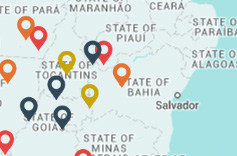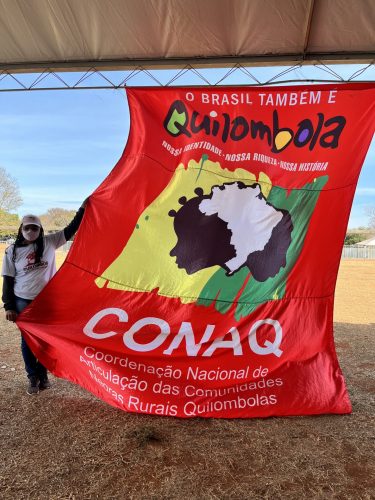
Promoted by Conaq, Aquilombar gathers more than 3,000 quilombolas in Brasília. Photo: Mariana Rodrigues/Acervo Fundo Brasil
In Brasília, the Ibero-American Cultural Hub (former Funarte) gained a single color and thousands of voices representing many millions of quilombolas across Brazil.
“We are making Brasilia Black with our quilombos to show that we exist, resist, and will fight for our rights, territories, and bodies,” said Águida Marina Ferreira from the Minas Gerais’ State Coordination of Quilombo Women Mariana Crioula.
Like Águida, this Wednesday (10), more than 3 thousand quilombolas from the Federal District and 22 other states were in Aquilombar, a political and cultural demonstration in the country’s capital. The National Coordination for the Articulation of Black Rural Quilombola Communities (Conaq) held the event to discuss the legal recognition of quilombola territories, fight racism, and demand the rights denied to these ancestral communities.”The Act Aquilombar initially wants to denounce how the government is dismantling the public policies aimed at quilombola communities. Our second goal is to show strength, to show that we exist, that we are alive, and they will not kill us,” affirms Jhonny Martins de Jesus, Conaq’s Executive Administrative Officer.
The initiative is the result of the joint efforts of quilombola representatives from different territories where Conaq is present and other partners who helped defray the logistic and infrastructure expenses for the groups to travel there.
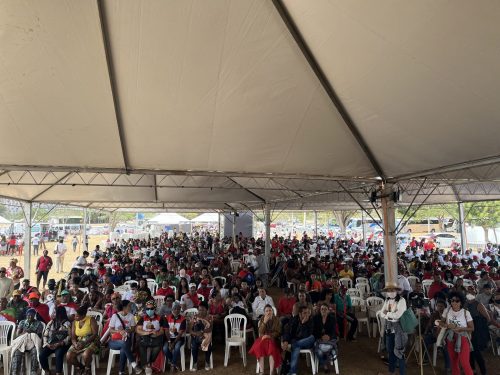
The event took place in front of the former National Arts Foundation (Funarte). Photo: Mariana Rodrigues/Acervo Fundo Brasil
Brazil Human Rights Fund was one of the organizations supporting Conaq in the Aquilombar Act. “Everything went well! But without our partners, this would have been impossible,” praised Jhonny.
“This is living proof of the work we have been doing together with the Brazil Fund. Your support allowed several states to be here. States that did not have any resources. In such a crisis, partnering with Brazil Fund was essential for the initiative to happen, and they all could aquilombar.
Demands of the territories under debate
Besides the cultural performances that lifted the spirits with the power of dances and drumbeats, the program included thematic panels. The panels discussed the main challenges faced by quilombolas in their territories, quilombola school education, racism and violence against young people and women, quilombola agriculture, social security, and land tenure regularization.
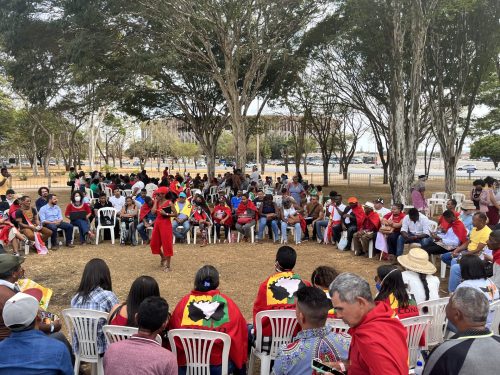
Panel on Land Tenure Regularization. Photo: Mariana Rodrigues/Acervo Fundo Brasil
According to Conaq’s calculations, 1,748 regularization requests from quilombola communities are awaiting analysis at INCRA. Besides, 55 processes are waiting for the titling process conclusion. This lack of regularization makes it difficult for the communities to access public policies and credit lines to purchase agricultural equipment.
“When we have the territory secured, we have the freedom to carry on with our education and culture. We will have the full right to come and go and to fight for health, culture, guaranteeing access to technology and other fundamental rights,” said Águida.
In addition to the debates on the territory’s challenges, the protesters held a general plenary session in a public hearing at the Senate’s Human Rights Commission to discuss the situation of communities across the country.
Manuel Oliveira dos Santos left Quilombo Mumbaça to participate in the act. The entourage from Alagoas traveled a little more than two days to be at the meeting. For him, all of his effort is worth it when he feels his voice is heard.
“We have come here, and we are going even further. For us, this moment was challenging. But it has never been easy for us. And what does that mean to us? It means that we must be especially united and organized for the sake of our people and our future. I want to thank Brazil Fund for the strengthening it has brought to our organization Gangazumba in Alagoas and for allowing our work to continue”, he said with emotion.
March toward the National Congress
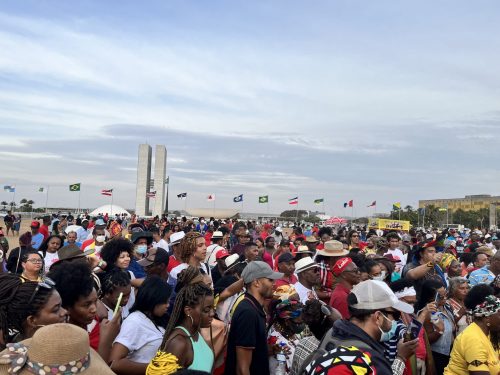
Quilombolas hold a demonstration in front of the National Congress. Photo: Mariana Rodrigues/Acervo Fundo Brasil
After Conaq served lunch, over 3 thousand quilombolas headed towards the National Congress, where a demonstration was held.
Throughout almost 3 km, quilombola representatives of every present state climbed the sound truck to shout on behalf of their territory.
Just ahead, the participants took over the lawn in front of the Congress. Holding up flags and banners and singing traditional songs representing their communities, the participants protested their demands with microphones and drums.
“From now on, the confrontation of the quilombola communities will be even greater. Here we recharge our batteries, for we will need a great deal of strength and ancestry in the year ahead, especially since it is an electoral year. Fighting for our rights is only possible when we strengthen ourselves, and now we are even stronger and united”, finishes Jhonny Martins de Jesus.






